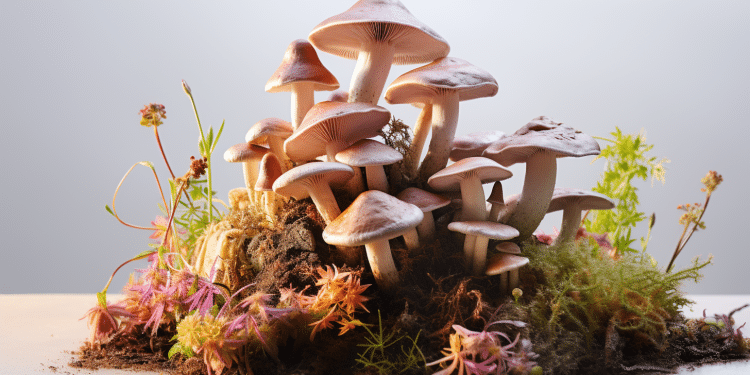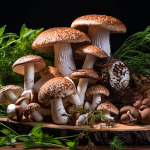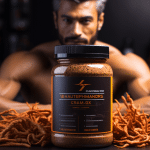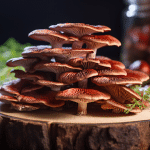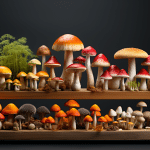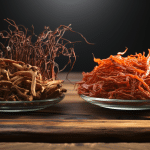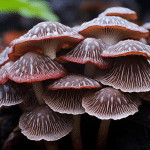Functional mushrooms are growing into a multi-billion dollar industry, and there’s just as much hype and confusion surrounding the trend as there was during the peak of the CBD trend. You probably have some questions about what these “shrooms” are, especially since influencers in the wellness sector are adding functional mushrooms to smoothies, coffee, and meals (and touting their benefits on social media). What exactly are functional mushrooms, and how do they benefit the human body?
We are on a mission to not only make functional mushrooms more accessible, but also to educate the masses on the many benefits of these natural healers. Here is our exclusive breakdown of functional mushrooms—what they are, what they do, why they’re worth a try, and how you can start incorporating these fantastic functional mushrooms into your daily life.
What Are Functional Mushrooms?
Functional mushrooms are mushrooms that have been discovered to aid in the maintenance of overall health and well-being in one form or another (e.g. lowering stress levels, improving cognitive function, providing a boost of energy, etc.). An estimated 2,000 species of fungi are considered edible or therapeutic, with 15 recognized to offer “functional benefits.” The most common functional mushrooms are reishi, chaga, lion’s mane, cordyceps, and turkey tail mushrooms.
Do Functional Mushrooms Come in Different Forms?
Powders, capsules (supplements), liquid sprays, and liquid drinks are all viable options for ingesting these beneficial mushrooms.
Learn more: Best medicinal mushrooms for bladder cancer
Functional Mushroom Benefits
Functional mushrooms, as the name implies, help to restore and balance your energy levels. They all work to strengthen your immune function, improve digestion, and give your skin a natural glow.
Mushrooms are rich in polyphenols, polysaccharides, beta-glucans, and antioxidants. These chemicals work together and independently to support your immune system. In other words, you won’t see immediate benefits, but the effects will become apparent over time. Mushrooms also contain a substantial amount of dietary fiber, which helps to promote good digestion and boost beneficial gut bacteria in your digestive system.
Functional mushrooms, on the other hand, have an enormous number of antioxidant properties that your skin (and the rest of your body!) appreciates. Glowing skin is also a result of whole-body health. The skin is the first indicator of any problem in your immune system or digestion. Functional mushrooms can help you maintain a healthy appearance by supporting your entire body’s well-being.
Learn more: Healthiest mushrooms
However, the greatest adaptogenic mushrooms are also therapeutic. This means they help the body when it is low on energy, exhausted, over-stressed, and other ailments. The capability of these plants to restore you to a normal rhythm is amazing.
Best Functional Mushrooms
Reishi, Lion’s Mane, and Chaga are the top three functional mushrooms, based on their healing properties. While ranking them would be like choosing a favorite child, the top three would most likely be Reishi, Lion’s Mane, and Chaga.
Reishi, being a powerful immune tonic and adaptogen, can help you maintain your daily stress levels while avoiding burnout. With our busy and hectic schedules, every balance we can get is better. That’s where Reishi comes in. Its adaptogenic qualities aid your body in dealing with occasional stress.
Lion’s Mane, on the other hand, is a useful fungus that improves attention power and creativity.
Chaga (the king of mushrooms) is jam-packed with antioxidants and aids in the maintenance of your immune system.
Common Questions About Functional Mushrooms
The most frequent question that is asked about psychedelic mushrooms are: Are these psychoactive ‘shrooms, and do they have a similar flavor to culinary mushrooms?
To be frank: No.
Because they don’t contain psilocybin, or psychedelic chemicals, these mushrooms won’t make you feel high. And while they don’t taste like culinary mushrooms, such as portobello or cremini mushrooms, they do have a harsh, earthy flavor.
Are Functional Mushrooms Safe?
Functional mushrooms can be beneficial to everyone. There are, however, a few exceptions. Pregnant women, nursing mothers, and those who are being treated for an ongoing health condition should consult with their doctor beforehand because functional mushrooms may clash with certain medications.
Use Functional Mushrooms Research
When purchasing functional mushrooms, the first thing you should examine is the company’s sourcing. Choose goods made with fruiting bodies, rather than mycelium (vegetative growth), as an example. You should also verify that the mushrooms have been removed from the substrate, not raw or intact, to ensure that the beneficial components are active when ingested.
After that, look into where and how the functional mushrooms are raised, as well as where/how they’re evaluated. If a company won’t provide you these details, it’s probably because they’re hiding something. One of our favorite brands, Real Mushrooms every single batch of our extracted functional mushroom products are tested in a third-party lab. They test for things like heavy metals, allergens, bad bacteria, yeasts, molds, mycotoxins, pesticides, and irradiation.
After you’ve acquired all of the information, make sure the useful mushrooms are presented in a way that appeals to you—in a powder, pill, liquid spray, or drink. With daily usage for lengthy durations of time, the greatest advantages of functional mushrooms become apparent. If you dislike taking a mushroom pill, it’s pointless to continue. Find a supplement that you genuinely enjoy so that you know you’ll keep using it.
Incorporate Functional Mushrooms Into Your Diet
functional mushrooms are not generally used in people’s everyday routines due to their unpleasant flavor and lack of understanding about the health benefits of edible mushrooms.
You may also use functional mushrooms to add flavor and nutrition to smoothies or to your favorite cup of coffee or tea. You can also experiment with them in hearty soups, stews, and ramen dishes.
